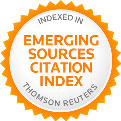Sport commitment and adherence: A social-cognitive analysis. (Compromiso deportivo y adherencia: Un análisis cognitivo social).
Resumen
Abstract
Statement of problem: This study aimed to analyse the ability of a model based on achievement motivation and self-determination theories to predict adherence to competitive sport. This model incorporated commitment as predictor of adherence. A prospective study was performed with a sample of 302 handball players aged between 14 and 18 years. Structural equation modelling gave support to the model proposed. It was verified the sequence of relationships between perceptions of coach-created mastery climate, psychological needs, self-determined motivation, commitment, and adherence. The major contribution of the study was to confirm a motivational model of adherence based on social-cognitive theories, considering commitment as a predictor of adherence.
Key words: motivation; self-determination; mastery climate; commitment; dropout.
Resumen
Este trabajo analizó la capacidad de un modelo basado en las teorías de la motivación d logro y de la autodeterminación para predecir la adherencia al deporte competitivo. Este modelo incorporó el compromiso como un predictor de la adherencia. La muestra estuvo compuesta por 302 jugadores de balomnano, con edades comprendidas entre los 14 y 18 años. El análisis mediante ecuaciones estructurales (Structural Equation Modelling) confirmó el modelo propuesto. Se verificó la secuencia de relaciones entre la percepción de clima de maestría creado por el entrenador, necesidades psicológicas, motivación autodeterminada, compromiso y adherencia. La principal aportación del estudio fue confirmar un modelo motivacional de la adherencia basado en teorías cognitivo-sociales, considerando el compromiso como un predictor de ésta.
Palabras clave: motivación; autodeterminación; clima de maestría; compromiso; adolescencia, abandono.
doi:10.5232/ricyde2011.02503
---------------------------------------------------------------------
References/referencias
Ames, C. (1992a). Classrooms, goals structres, and student motivation. Journal of Educational Psychology, 84, 261-274.
doi:10.1037/0022-0663.84.3.261
Biddle, S.; Cury, F.; Goudas, M.; Sarrazin, P.; Famose, J.P., & Durand, M. (1995) Development of scales to measure perceived physical education class climate: a cross-national project. British Journal of Educational Psychology, 65, 341-358.
PMid:7577561
Boixadós, M.; Cruz, J.; Torregrosa, M., & Valiente, L. (2004). Relationships among motivational climate, satisfaction, perceived ability, and fair play attitudes in Young soccer players. Journal of Applied Sport Psychology, 16, 301-317.
doi:10.1080/10413200490517977
Deci, E.L., & Ryan, R.M. (2000). The “What” and “Why” of goal pursuits: Human needs and the self-determination theory. Psychological Inquiry, 11, 227-268.
doi:10.1207/S15327965PLI1104_01
Deci, E.L., & Ryan, R.M. (1985a). The general causality orientations scale: Self-determination in personality. Journal of Research in Personality, 19, 109-134.
doi:10.1016/0092-6566(85)90023-6
Li, F., & Harmer, P. (1996). Testing the simple assumption underlying the Sport Motivation Scale: A structural equation modeling analysis. Research Quarterly for Exercise and Sport, 67, 396-405.
PMid:9016481
Ntoumanis, N. (2005). A Prospective Study of Participation in Optional School Physical Education Using a Self-Determination Theory Framework. Journal of Educational Psychology. 97 (3), 444-453.
doi:10.1037/0022-0663.97.3.444
Ommundsen, Y.; Roberts, G.; Lemyre, P.N., & Miller, B.W. (2005). Peer relationships in adolescent competitive soccer: Associations to perceived motivational climate, achievement goals and perfeccionism. Journal of Sports Sciences, 23, 977-989.
doi:10.1080/02640410500127975
PMid:16195049
Pelletier, L.G.; Fortier, M.S.; Vallerand, R.J., & Brière, N.M. (2001). Associations among perceived autonomy support, forms of self-regulation, and persistence: A prospective study. Motivation and Emotion, 25, 279-306.
doi:10.1023/A:1014805132406
Reinboth, M.; Duda, J.L., y Ntoumanis, N. (2004). Dimensions of coaching behavior, need satisfaction, and the psychological and physical welfare of Young athletes. Motivation and Emotion, 28, 297-313.
doi:10.1023/B:MOEM.0000040156.81924.b8
Ryan, R.M., & Connell, J.P. (1989). Perceived locus of causality and internalization: examining reasons for acting in two domains. Journal of Personality and Social Psychology, 57, 749-761.
doi:10.1037/0022-3514.57.5.749
PMid:2810024
Sarrazin, P.; Vallerand, R.; Guillet, E.; Pelletier, L., & Cury, F. (2002). Motivation and dropout in female handballers: A 21-month prospective study. European Journal of Social Psychology, 32, 395-418.
doi:10.1002/ejsp.98
Smith, S. L.; Fry, M. D.; Ethington, C. A., & Li, Y. (2005). The effect of female athletes’ perceptions of their coaches’ behaviours on their perceptions of motivational climate. Journal of Applied Sport Psychology, 17, 170-177
doi:10.1080/10413200590932470
Vallerand, R.J., y Bissonette, R. (1992). Intrinsic, extrinsic, and amotivational styles as predictors of behavior: A prospective study. Journal of Personality, 60, 599-620.
doi:10.1111/j.1467-6494.1992.tb00922.x
Vallerand, R.J., & Losier, G.F. (1999). An integrative analysis of intrinsic and extrinsic motivation in sport. Journal of Applied Sport Psychology, 11, 142-169.
doi:10.1080/10413209908402956
---------------------------------------------------------------------
Palabras clave/key words
Texto completo/Full Text:
PDF------------------------ 0 -------------------------
RICYDE. Revista Internacional de Ciencias del Deporte
![]()

Publisher: Ramón Cantó Alcaraz
ISSN:1885-3137 - Periodicidad Trimestral / Quarterly

